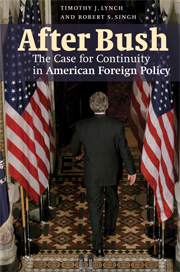Book contents
- Frontmatter
- Contents
- List of figures
- Acknowledgements
- Introduction: Winning the Second Cold War
- Chapter 1 Bush and the American foreign policy tradition
- Chapter 2 The constitution of American national security
- Chapter 3 The Second Cold War on Islamist terror: negative audits
- Chapter 4 The Second Cold War on Islamist terror: a positive audit
- Chapter 5 Iraq: Vietnam in the sand?
- Chapter 6 The Middle East: reformation or Armageddon
- Chapter 7 Frineds and foes after Bush
- Chapter 8 The emerging consensus at home and aborad
- Conclusion: The case for contiuity
- Notes
- Bibliography
- Index
Chapter 3 - The Second Cold War on Islamist terror: negative audits
Published online by Cambridge University Press: 22 September 2009
- Frontmatter
- Contents
- List of figures
- Acknowledgements
- Introduction: Winning the Second Cold War
- Chapter 1 Bush and the American foreign policy tradition
- Chapter 2 The constitution of American national security
- Chapter 3 The Second Cold War on Islamist terror: negative audits
- Chapter 4 The Second Cold War on Islamist terror: a positive audit
- Chapter 5 Iraq: Vietnam in the sand?
- Chapter 6 The Middle East: reformation or Armageddon
- Chapter 7 Frineds and foes after Bush
- Chapter 8 The emerging consensus at home and aborad
- Conclusion: The case for contiuity
- Notes
- Bibliography
- Index
Summary
My own suspicion is that many Americans have enjoyed Bush's ‘terror war’ more than they wish to admit. Feeling scared can be oddly pleasurable, like participating in a real-life action thriller, when one is allied in imagined combat with a united country of brave patriots. The plot line is simple – good guys against satanic forces – and pushes aside doubts and ambiguities, like why exactly these people are out to get us. Does our own behavior in the world have anything to do with it? No, they resent us because we are so virtuous – kind, free, wealthy, democratic. The contest, as framed by Bush, invites Americans to indulge in a luxurious sense of self-pity – poor, powerful America, so innocent and yet so misunderstood. America's exaggerated fear of unknown ‘others’ is perhaps an unconscious inversion of its exaggerated claims of power.
William GreiderThe pseudo-left has too great an investment in anti-Americanism to admit that there can be a reason for evil independent of Washington's control.
Clive JamesThis notion that inside every human being is the burning desire for freedom and liberty, much less democracy, is probably not the case. I don't think anyone knows what burns inside others. Food, shelter, security, stability. Have you read Erich Fromm, ‘Escape from Freedom’? I don't agree with him, but some people don't really want to be free.
Brent Scowcroft- Type
- Chapter
- Information
- After BushThe Case for Continuity in American Foreign Policy, pp. 84 - 110Publisher: Cambridge University PressPrint publication year: 2008



